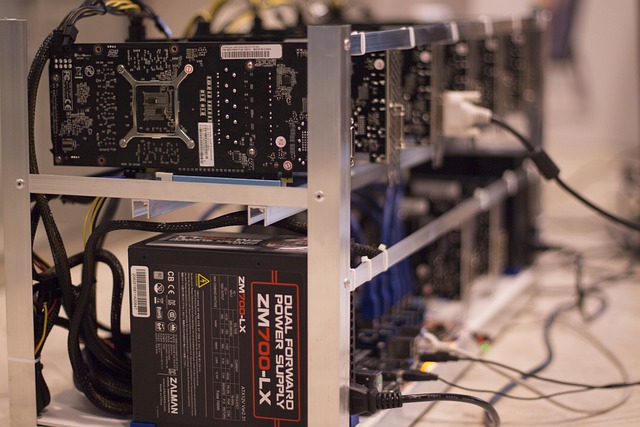Decentralized Finance Companies: Shaping the Financial Landscape
Decentralized Finance Companies: Shaping the Financial Landscape

The Evolution of Financial Systems: How Decentralized Finance Companies are Disrupting Traditional Models
Decentralized finance companies have emerged as a force to be reckoned with in the world of financial systems. With their revolutionary approach, these companies are challenging the traditional models that have long been dominated by central authorities. By leveraging blockchain technology and smart contracts, decentralized finance companies are empowering individuals to take control of their finances, eliminating the need for intermediaries and opening up a world of opportunities.
One of the key ways in which decentralized finance companies are disrupting traditional models is by democratizing financial services. Previously, accessing certain financial services, such as loans or investments, was often restricted to a select few who met strict criteria. However, with decentralized finance, anyone with an internet connection can participate and access a wide range of financial products and services. This level of accessibility is leveling the playing field and giving individuals from all walks of life the chance to build wealth and prosper.
Empowering Individuals: How Decentralized Finance Companies are Democratizing Financial Services
Decentralized finance companies are revolutionizing the financial landscape by democratizing financial services. Traditional financial institutions have long held the monopoly over banking and investment opportunities, leaving many individuals excluded from the system. However, decentralized finance opens up a world of possibilities for anyone with an internet connection.
One way decentralized finance companies empower individuals is through peer-to-peer lending platforms. These platforms allow borrowers and lenders to connect directly, removing the need for intermediaries. This not only reduces costs but also enables individuals to access credit regardless of their geographical location or social status. By cutting out the middleman, decentralized finance companies are leveling the playing field, giving everyone an equal opportunity to participate in the financial system.
The Advantages of Decentralized Finance Companies: Transparency, Security, and Trust
Transparency, security, and trust are among the key advantages offered by decentralized finance companies. One of the primary benefits is the transparency of transactions, as blockchain technology enables a public ledger that records every transaction made. This transparency eliminates the need for intermediaries and reduces the risk of fraud or manipulation. As a result, individuals have direct visibility into their financial transactions, fostering a sense of trust in the system.
In addition to transparency, decentralized finance companies offer enhanced security. Traditional financial systems are often susceptible to cyberattacks and data breaches. However, decentralized finance platforms employ sophisticated cryptographic techniques that protect user information and ensure the integrity of transactions. By eliminating the centralized points of vulnerability, these companies enhance the security of financial transactions, providing individuals with peace of mind and confidence in their investments.
Unlocking Opportunities: Exploring the Range of Financial Products and Services offered by Decentralized Finance Companies
As decentralized finance companies continue to gain momentum, they are opening up a wide range of financial products and services that were once only accessible through traditional financial institutions. This democratization of finance has provided individuals with unprecedented opportunities to explore and participate in various investment schemes, lending platforms, and payment systems.
One of the primary offerings of decentralized finance companies is the ability to invest in a diverse range of assets. Through these platforms, individuals can invest in cryptocurrencies, tokenized assets, and even real-world assets such as real estate and art. This not only allows for diversification of investment portfolios but also enables individuals to participate in markets that were previously limited to institutional investors.

The range of services offered by decentralized finance companies goes beyond investments and lending. Users can also take advantage of decentralized payment systems, remittance platforms, and decentralized exchanges. These platforms enable swift, secure, and low-cost transactions, making them particularly attractive for individuals conducting cross-border transactions. Furthermore, decentralized insurance platforms are emerging, offering users the opportunity to protect their digital assets against various risks, such as smart contract failures or hacks.
As decentralized finance companies continue to innovate and expand their offerings, individuals now have an array of opportunities to explore and participate in the growing decentralized finance ecosystem. By providing access to a diverse range of financial products and services, these companies are empowering individuals to take control of their financial future and unlocking new avenues for wealth creation.
The Role of Blockchain Technology in Decentralized Finance Companies: Enabling Efficiency and Innovation
Blockchain technology plays a vital role in enabling efficiency and innovation among decentralized finance companies. By removing the need for intermediaries and allowing for direct peer-to-peer transactions, blockchain technology streamlines processes and reduces transaction costs. This efficiency not only benefits individuals by providing faster and cheaper financial services but also fosters innovation as it opens up new possibilities for creating and accessing financial products.
One key aspect of blockchain technology is its ability to provide transparency and trust in financial transactions. With its decentralized and distributed ledger, blockchain ensures that all transactions are recorded and verified by multiple participants, making it nearly impossible to manipulate or tamper with the data.

Overcoming Challenges: Addressing Regulatory and Compliance Issues in the Decentralized Finance Space
Decentralized finance companies have emerged as a powerful force in the financial world, offering innovative solutions that challenge traditional models. However, this disruptive nature presents its own set of challenges when it comes to regulatory and compliance issues. The decentralized nature of these companies means that the lack of a central authority can create concerns around maintaining transparency, ensuring security, and meeting regulatory requirements.
One of the main challenges faced by decentralized finance companies is navigating the ever-changing regulatory landscape. As the technology evolves and the industry matures, regulatory bodies around the world are playing catch-up to address the unique characteristics of decentralized finance. However, this lack of clear guidelines and frameworks can create uncertainty and hinder the growth of these companies. It is crucial for decentralized finance companies to engage with regulators and work together to establish a balanced regulatory framework that protects consumers without stifling innovation.
An Inside Look: Understanding the Operations and Governance of Decentralized Finance Companies
Decentralized finance companies have gained significant attention in recent years, offering a new approach to financial systems. These companies operate on blockchain technology, which allows for the removal of intermediaries and facilitates direct peer-to-peer transactions. This means that individuals can engage in financial activities such as lending, borrowing, and investing without the need for traditional banks or financial institutions.
In terms of governance, decentralized finance companies often utilize a decentralized autonomous organization (DAO) structure. This means that decision-making processes are collectively made by token holders, who have voting rights proportional to their holdings. This democratic approach to governance ensures transparency and allows all stakeholders to have a say in the operations and development of the company. Moreover, smart contracts, a feature of blockchain technology, enable the automatic execution of agreements based on predefined conditions, further enhancing the efficiency and accountability of decentralized finance companies.
The Growing Impact of Decentralized Finance Companies on Traditional Financial Institutions
Decentralized finance companies have been steadily gaining traction in recent years, causing significant disruptions to the traditional financial landscape. These innovative platforms operate on blockchain technology, enabling them to offer a range of financial services and products in a decentralized manner. As a result, they have become increasingly popular among individuals seeking more control and autonomy over their finances.
The growing impact of decentralized finance companies on traditional financial institutions cannot be ignored. These companies are challenging the long-standing norms of the financial industry by providing alternatives that are more efficient, transparent, and accessible. With blockchain technology at their core, decentralized finance companies are able to eliminate the need for intermediaries, such as banks, and offer services like lending, borrowing, and investing directly to individuals. This not only reduces costs but also improves the speed and convenience of financial transactions, ultimately empowering individuals to have a greater say in their financial affairs. Moreover, the transparency and immutability provided by blockchain technology instill a sense of trust and security, further enticing individuals to move away from traditional financial institutions.
The impact of decentralized finance companies on traditional financial institutions is no longer a distant concept but a reality that is gaining momentum. As more individuals become aware of the advantages offered by these platforms, the number of users will continue to grow. This, in turn, poses a considerable threat to traditional financial institutions, as they risk losing customers to decentralized finance companies. To stay relevant in this changing landscape, traditional financial institutions must adapt to the demands and expectations of the modern consumer, embracing technology and innovation to provide more accessible, efficient, and transparent financial services. Failure to do so may result in their diminishing relevance in the financial industry.
Exploring the Risks and Rewards of Investing in Decentralized Finance Companies
Investing in decentralized finance companies can offer both risks and rewards. On one hand, the decentralized nature of these companies can provide individuals with greater control over their finances and the potential for higher returns. By eliminating intermediaries and enabling peer-to-peer transactions, decentralized finance companies offer a level of transparency that can be appealing to investors. Additionally, the use of blockchain technology enhances security and trust in these systems.
However, it is important to note that investing in decentralized finance companies is not without its challenges. Regulatory and compliance issues can arise due to the relatively new and evolving nature of this industry. Without proper oversight, there may be concerns regarding fraud, money laundering, and other illicit activities. Additionally, the decentralized nature of these companies means that there may be limited recourse in the event of disputes or losses. As with any investment, it is crucial to conduct thorough research and due diligence before investing in decentralized finance companies to fully understand the potential risks and rewards involved.
• Greater control over finances and potential for higher returns
• Transparency through elimination of intermediaries and peer-to-peer transactions
• Enhanced security and trust with the use of blockchain technology
However, investing in decentralized finance companies also comes with its challenges:
• Regulatory and compliance issues due to the industry’s new and evolving nature
• Concerns about fraud, money laundering, and illicit activities without proper oversight
• Limited recourse in disputes or losses due to the decentralized nature
To make an informed investment decision in decentralized finance companies, it is crucial to:
1. Conduct thorough research on the company’s background, team members, and track record.
2. Understand the regulatory environment surrounding these companies to identify any potential risks or legal hurdles.
3. Assess the company’s security measures and protocols for protecting user funds from cyber threats.
4. Evaluate the scalability of their platform to ensure it can handle increasing transaction volumes without compromising performance.
5. Stay updated on industry trends, news, and developments that may impact your investment.
Investing in decentralized finance companies can be a lucrative opportunity but requires careful consideration of both risks and rewards. By taking a proactive approach towards understanding this emerging sector, investors can navigate potential pitfalls while capitalizing on its benefits.
Future Outlook: Predictions and Trends for the Continued Growth and Development of Decentralized Finance Companies
As decentralized finance companies continue to gain traction and disrupt the traditional financial landscape, experts predict a bright future filled with immense growth and development. One of the key predictions is the widespread adoption of these innovative platforms, driven by the increasing demand for financial services that offer transparency, security, and autonomy. Individuals are becoming more empowered to take control of their finances, thanks to the democratizing nature of decentralized finance companies.
Furthermore, the integration of blockchain technology is expected to play a pivotal role in the continued growth of decentralized finance companies. Blockchain ensures the efficiency and security of transactions, eliminating the need for intermediaries and reducing costs. This technology also enables the creation of innovative financial products and services, opening up endless opportunities in the decentralized finance space. As regulatory frameworks continue to adapt and evolve, these companies will have the opportunity to overcome compliance challenges, fostering an environment of trust and stability.
The future outlook for decentralized finance companies is promising, with predictions pointing towards a continued trajectory of expansion and disruption. The increasing demand for transparency, security, and financial autonomy, combined with advancements in blockchain technology, will underpin the growth and development of this industry. As decentralized finance companies continue to offer a range of innovative products and services, individuals will have more opportunities to participate in and shape the future of finance.
What is decentralized finance (DeFi)?
DeFi stands for decentralized finance, which refers to the use of blockchain technology and smart contracts to provide financial services without the need for intermediaries like banks.
How are decentralized finance companies disrupting traditional financial systems?
By leveraging blockchain technology, decentralized finance companies are challenging traditional financial models by offering transparent, secure, and efficient solutions that empower individuals.
What are the advantages of decentralized finance companies?
Decentralized finance companies offer transparency, security, and trust through the use of blockchain technology. They also democratize financial services, making them accessible to a wider range of individuals.
What kind of financial products and services do decentralized finance companies offer?
Decentralized finance companies offer a wide range of financial products and services, including lending, borrowing, staking, yield farming, decentralized exchanges, and more.
How does blockchain technology enable efficiency and innovation in decentralized finance companies?
Blockchain technology allows for transparent and tamper-proof record-keeping, eliminates the need for intermediaries, and enables the automation of financial processes, leading to increased efficiency and innovation.
What challenges do decentralized finance companies face in terms of regulations and compliance?
Decentralized finance companies are still navigating the regulatory landscape, as existing regulations were not designed with blockchain technology in mind. Compliance with anti-money laundering (AML) and know your customer (KYC) requirements is also a challenge.
How do decentralized finance companies operate and govern themselves?
Decentralized finance companies operate on decentralized networks, with governance often being carried out through voting mechanisms by token holders.

How are decentralized finance companies impacting traditional financial institutions?
Decentralized finance companies are challenging traditional financial institutions by offering alternative financial services that are more accessible, efficient, and transparent. This disruption is forcing traditional institutions to adapt and innovate.
What are the risks and rewards of investing in decentralized finance companies?
Investing in decentralized finance companies can be highly rewarding due to the potential for high returns and early adoption of innovative technologies. However, it also carries risks such as smart contract vulnerabilities, market volatility, and regulatory uncertainties.
What are the predictions and trends for the future growth of decentralized finance companies?
The future outlook for decentralized finance companies is positive, with continued growth expected. Trends include increased integration with traditional finance, regulatory advancements, broader adoption, and the development of more sophisticated financial products and services.
Todays Featured Product:
Buy, exchange and grow your crypto securely with a Ledger hardware wallet, combined with the Ledger Live app. It’s never been easier to keep your crypto safe and accessible. Buy direct from Ledger.com and get todays Special Offers Here.




